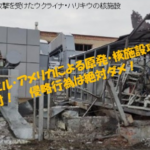河野談話の検証結果を6月20日に発表した安倍政権を批判する社説が『ニューヨーク・タイムズ』に掲載された。ウェブ版では22日、紙面では23日にニューヨーク版に出た。日本語訳を紹介する(訳は発表後微修正することがある)。
Japan’s Historical Blinders 日本による歴史の目隠し
Apology for World War II Sex Slaves Is Again at Issue 第二次世界大戦時性奴隷への謝罪が再び論争になる [訳者注:ここでの「謝罪」は河野談話を指す。]
http://www.nytimes.com/2014/06/23/opinion/apology-for-world-war-ii-sex-slaves-is-again-at-issue.html
At a time when constructive relations between Japan and South Korea are more important than ever to Asian security, the two countries, allies of the United States, have been unable to put a difficult history behind them. Unfortunately, that seems unlikely to change soon given the release on Friday of a Japanese report on World War II sex slaves.
アジアの安全保障のために日本と韓国の間に建設的な関係が今ほど大切なときはないというときに、米国の同盟国であるその二国は困難な歴史を乗り越えることができないでいる。あいにく、金曜日に第二次世界大戦時の性奴隷についての日本の報告書が発表され、その状態がすぐに変わる見込みはなくなった。
Prime Minister Shinzo Abe used the report’s release to reaffirm Japan’s commitment to a 1993 statement admitting for the first time that thousands of women from Korea and other countries had been coerced into providing sex to Japanese soldiers and apologizing for those atrocities. But if this was supposed to calm tensions with South Korea it misfired, because the report appeared to raise doubts about the accuracy of the 1993 apology. It said the apology resulted from intense behind-the-scenes negotiations with South Korea and seemed to question whether it was based on solid evidence.
安倍晋三首相はこの報告書の発表をもって、1993年の談話へのコミットメントを再確認した。その談話は、朝鮮半島や他の国々から何千あるいは何万もの[訳者注:英語では thousandsなので、意味は「何千」でも「何万」でもあり得る]女性が日本兵に性を提供することを強いられたことを初めて認め、これらの残虐行為に対して謝罪したものだ。しかしこの報告書が韓国との緊張を和らげることを意図されたとしたらそれは失敗に終わった。この報告書は1993年の談話の正確さに疑いを抱いているように見えるものだったからだ[訳者注:この社説では the apology 「謝罪」というのは河野談話そのものを指しているのでこの訳文ではわかりやすいように「河野談話」「談話」と訳している]。この報告書は、河野談話が舞台裏における韓国との激しい交渉の結果生まれたものであると言っており、確実な証拠に基づいたものであるかどうかに疑問を呈しているように見えるものだった。
Many historians outside of Japan agree that the Japanese military forced women to work in brothels, yet Japanese nationalists continue to insist the women were prostitutes and were not forced into servitude by the authorities.
日本国外の多くの歴史家は、日本の軍隊が女性たちに慰安所で働くことを強いたことに合意しているが、日本の国家主義者たちはこの女性たちが売春婦であった、そして当局によって奴隷状態を強いられたのではないと主張し続けている。
Mr. Abe has done an injustice to the victims of this wartime crime and hurt his country by pandering to a narrow nationalist political fringe in ordering up the report in the first place. During his first time as prime minister, in 2006 and 2007, he endorsed the nationalists’ position; during his second tenure, which began in late 2012, he signaled that he might seek to revise the apology. Subsequent statements, including Mr. Abe’s insistence in March that he shared his predecessors’ “heartache” over the women’s plight, have done little to calm South Korean apprehensions. For South Koreans the report – by revealing the consultations between the two governments when the 1993 statement was being drafted – shows that Japan has never been sincere about the apology. Consultations are crucial for relations between countries, especially on sensitive issues, and it is perverse that talks would be cast in a negative light.
安倍氏は、そもそも検証を指示することで、限定的な国家主義的政治一派の歓心を買うことにより、この戦時中の犯罪の被害者たちを不当に扱い、自国に損害をもたらしている。2006年から2007年までの首相第一期目のとき、国家主義者たちの立場を支持した。2012年末に始まった第二期目には、この談話を見直すかもしれないとの兆しを見せた。3月に安倍氏が強調したような、女性たちの苦しみを思うと歴代首相と同じように「心が痛む」と言ったことも含めて、その後の数々の発言は韓国の人々の不安を和らげるには至らなかった。韓国の人々にとって報告書は-1993年の談話が起草されていた間の二政府の間の協議を明らかにすることによって-日本はその談話について誠実ではなかったということを示すものであった。国家間の関係にとって協議とすることは極めて重要であり、それは繊細な問題ほどそうであるが、話し合いが否定的なイメージを与えられることは道理に反する。
Japanese nationalists will undoubtedly use the report to push the government to retract the apology. It’s time Mr. Abe made it clear to his country and to the world that the “deniers” are wrong. His continued willingness to play to that political fringe is interfering with Japan’s ability to carry on its leading role in the region. Any reasonable American strategy for managing China’s increasingly aggressive actions in Asia depends heavily on cooperation with Japan and South Korea.
日本の国家主義者たちは疑いようもなくこの報告書を政府に談話を撤回させるよう圧力をかけるために使うであろう。今こそ安倍氏は自国と世界に対し「否定論者」は間違っているということを明確にすべきであろう。安倍氏が進んでこの政治一派のご機嫌を取り続けることは日本が地域における指導的役割を果たしていく能力を妨げている。米国が、アジアにおいて増している中国の強気の行動に対処していくために合理的な戦略を作っていくには、日本と韓国との協力がどれだけ得られるかに大きく掛かっているのである。
This is also an especially awkward time for Japan to leave any doubts about the issue of its wartime sex slaves. There has been increasing and proper attention focused by the international community on sexual violence in armed conflict; governments and human rights groups have demanded that offenders be prosecuted and victims cared for.
また、特に現在は日本にとっても戦時性奴隷問題について疑念を残すことがあってはまずいタイミングなのである。武力紛争における性的暴力への国際社会による適切な注目が増しているところだ。各国政府や人権団体が、違反者を告発し被害者をケアするようにとの要求をしてきている。
At a conference on that issue in London this month, the head of the Japanese delegation, Nobuo Kishi, Mr. Abe’s brother, said: “Sexual violence is a crime. It is important to eliminate the culture of impunity against the perpetrators and to change our mind-sets.” As a democracy and the world’s third-largest economy, Japan cannot be seen as trying to rewrite its past.
先月この問題における会議がロンドンで開かれた[訳者注:6月10日から4日間開催された紛争下での性暴力撲滅を目指す国際会議]が、日本代表で派遣されていた安倍氏の弟である岸信夫氏は、「性暴力は犯罪である。犯人が責任を問われないという文化を排除し我々の考え方を変えていくことが大事である」と言っている。民主主義国家であり世界第三位の経済大国として、日本が過去を書き換えようとしているとみられるようなことがあってはならない。
(以上)
初出:「ピースフィロソフィー」2014.6.24から許可を得て転載
http://peacephilosophy.blogspot.jp/2014/06/new-york-times-editorial-criticizes.html
〈記事出典コード〉サイトちきゅう座http://www.chikyuza.net/
〔eye2676:140625〕







